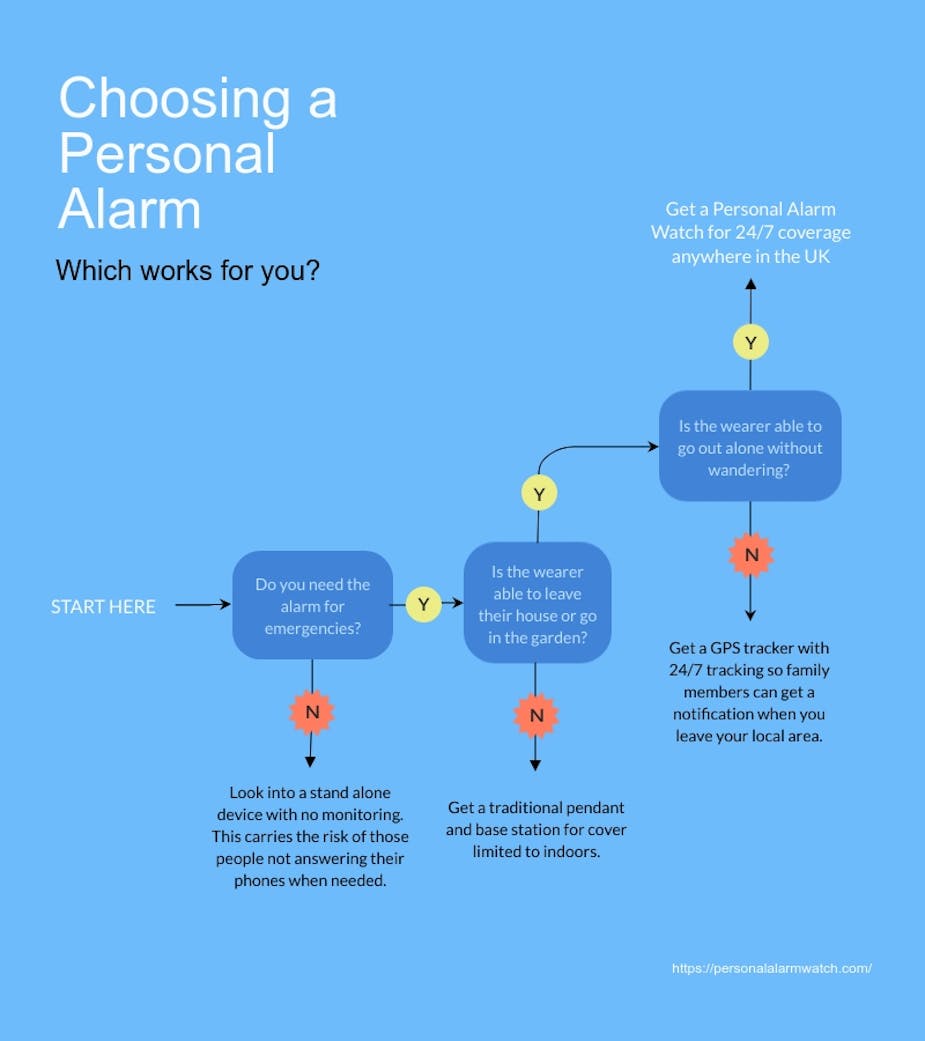Factors to consider in choosing the best personal alarm for you
Design
Do you want the traditional red button type personal alarm, or a more discreet, modern alternative? It’s important to remember that the design often goes beyond mere aesthetics, and often results in functional differences between personal alarms. For instance, when choosing a personal alarm designed to be worn on the wrist, you should ensure that the button is raised so that emergency calls can be made one handed. And with necklace type alarms, it’s always worth testing the ‘twist factor’ - this is how likely the alarm is to get twisted in your clothes and become a nuisance.
Range
Are you happy with a personal alarm that works only in your home, or would you prefer extended range? Some personal alarms offer coverage up to your garden, and the more modern personal alarms work anywhere in the UK by connecting to a mobile network. Unless housebound, we would recommend opting for a personal alarm that allows you to make emergency calls anywhere in the UK. It’s also worth bearing in mind that, in 2025, landline-linked personal alarm devices will become obsolete, so it may be wise to consider a device that connects to a mobile network today.
Cost
When choosing a personal alarm, do not be fooled by a lower upfront cost and ensure that you also take the monitoring fee into consideration. The majority of personal alarm devices typically charge around £50-£150 up front, with an additional monitoring charge of £20 monthly.
GPS
Personal alarms that work UK-wide will typically offer GPS. This allows the monitoring team to get your approximate location, and can prove to be extremely handy if the wearer has dementia (or a similar condition). Whilst this has a negative impact on battery life, it should be considered an essential feature in some cases. It’s also important to note that, given the obvious privacy concerns some would have with location tracking, most GPS type personal alarms offer the option to only share the location at the time of an emergency.
Preparing your home for a personal alarm
When it comes to preparing your home for a personal alarm, this is dependent on whether you choose a fixed or go-anywhere alarm. If you’re still unsure, have another read of our guide to choosing a personal alarm, or give us a call. We’re always happy to help.
Fixed personal alarms
These alarms have a base station that uses your landline. You will need to ensure your landline is active and you have space to plug it in. If you have a security alarm connected to the landline too, you will need to ensure the fixed alarm can override this. If you’re not sure, most fixed alarm providers offer to do the installation for you for a fee.
Go-anywhere personal alarms
They don't use landlines so there is no preparation involved. With our alarm (the YourStride Alarm Watch) it even comes fully charged up, ready to use. This means you just switch it on, wear it and you are good to go.
Selecting named emergency contacts for your personal alarm
Emergency contacts are the people that a 24/7 personal alarm monitoring team can contact to come and help you when in need. If the emergency services have been contacted, your named contacts would be able to come to you to help before they reach. If they have a key, they can even let the emergency service in. Typically, they will also be kept-up-date should the need arise. There’s more information on Key Safes further down in this article.
We always recommend identifying friends, family or neighbours that are nearby and have a key for your emergency contact. We have found that two or three are best, although if you have a keysafe then emergency contacts are not a prerequisite.
After you have identified the right emergency contacts, you will need to get permission from them. We record their name, address, contact number and whether or not they have a key. If your contact doesn't have a key, you may want to consider cutting them a spare or installing a key safe.
Key safes and personal alarms
If you do not have any suitable emergency contacts, we would advise getting a key safe. Key Safes are lock boxes that securely store a key. They are accessed using a code, and offer a trusted person the ability to enter your home should the need arise. It means that the contact doesn’t have to worry about ensuring that a spare key is always in their possession.
Key Safes are a much safer alternative to cutting numerous copies of a single key, leaving a spare under the mat or behind a plant pot. With that said, it’s important to choose the right Key Safe, and we’ll only ever recommend one that is accredited by the police. To be certain that your Key Safe is secure, ensure that it has a ‘Secured By Design’ logo visible. This logo means that the Key Safe has passed industry attack tests, and should be at least as secure as your front door.
You can find out more information on choosing a key safe by clicking here.
Talking to your family about personal alarm options
As with most decisions in life, it doesn’t hurt to get a second opinion. That’s why it helps to discuss different personal alarm options with your family or your friends to work out what is best for you. You may even want them as contacts for the monitoring team to reach in emergencies so it is useful to make sure they are happy with your choice.
After you have chosen one, let them know what you have selected so they know what to expect if they are contacted. If you opt for the YourStride Alarm Watch, we automatically get in touch with your emergency contacts and give them some background and a guide. This ensures that they are ready, and know exactly what to do in the event of an emergency.
If you need more advice then our team is very happy to help. Do give us a call on 020 3868 5575 with any questions.

